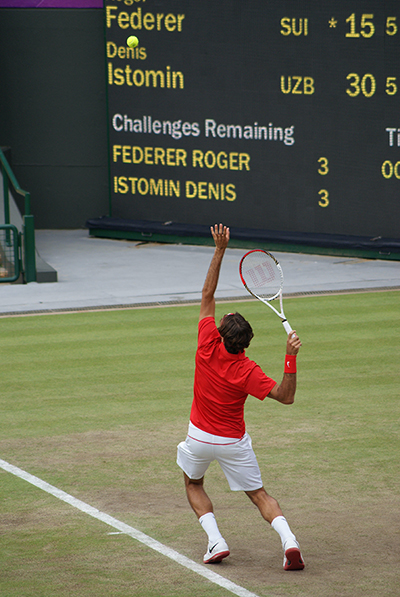Arguments
We’ve all encountered that situation in which we think one thing, and someone else thinks another. Perhaps you think that Roger Federer is the greatest tennis player of all time, whereas I think that Serena Williams is. Or perhaps you think that there is intelligent alien life elsewhere in the Universe, whereas I think there isn’t. Or perhaps you think that Wellington is the capital of New Zealand, while I think it’s Auckland. It’s possible to disagree about almost anything.
 Roger Federer serving during one of his matches at the 2012 London Olympics.
Roger Federer serving during one of his matches at the 2012 London Olympics.
Most of the time, people can give reasons for what they think. Why think that Federer is the greatest tennis player? Perhaps, in your opinion, Federer is the most graceful tennis player on court. I might respond by pointing out that Williams has won the most Grand Slam singles titles since tennis professionalised in 1968. And why think there’s intelligent alien life? Perhaps you’d say that, statistically, given the vastness of the Universe, intelligent life is unlikely to have evolved just once. I might respond by saying that, if there were intelligent alien life, we would have come into contact with it by now.
Philosophers like to represent people’s reasons for what they think as arguments. An argument involves one or more claims, called premises, which are presented in support of a conclusion. For example, we might represent our disagreement about tennis like this:
Your Argument
-
Premise: Federer is the most graceful tennis player on court.
-
Conclusion: Federer is the greatest tennis player of all time.
My Argument
-
Premise: Williams has won the most Grand Slam singles titles since tennis professionalised.
-
Conclusion: Williams is the greatest tennis player of all time.
Testing Arguments
Displaying our disagreement like this is helpful, because we have tests for assessing arguments. Here are the two most important tests.
- First test: Are all the premises true?
- Second test: If the premises were true, would they support the conclusion?
For an argument to be a good one, it should pass both tests.
Let’s begin by applying the first test to your argument. There is only one premise: ‘Federer is the most graceful player on court’. Is that premise true? There are various ways we might try to work that out. We might survey tennis experts, or the general public, we might discuss what counts as gracefulness in tennis and examine the footage ourselves, or something else. Perhaps, when we do the research, we’ll decide that the premise is true; or perhaps we won’t. It isn’t obvious whether Your Argument passes the first test.
In contrast, My Argument does pass the first test. At time of writing, Williams has won the most Grand Slam singles titles since tennis professionalised. But does it pass the second test? Well, you might reasonably wonder why I am ignoring Grand Slam doubles titles. After all, taking those into account as well, Martina Navratilova has won the most titles since tennis professionalised. And what about Grand Slam titles before then? If we take those into account, then Margaret Court has won the most Grand Slam titles. So, even if we think that Grand Slam titles are indicative of greatness, it’s not clear that Serena Williams comes out on top. So it’s debatable whether My Argument passes the second test.
We would need to do more research, or develop more arguments, to work out whether either argument is a good argument.
Confirmation Bias
Testing arguments, then, is difficult. And it would be difficult even if we could be completely objective. But, to make matters worse, we’re not completely objective.
Repeated psychological experiments have shown that humans suffer from a confirmation bias. What that means is that people – including you and me – tend to be biased in favour of our own thoughts and beliefs.
Repeated psychological experiments have shown that humans suffer from a confirmation bias. What that means is that people – including you and me – tend to be biased in favour of our own thoughts and beliefs. We unconsciously select arguments and evidence that support what we already believe, and ignore or dismiss arguments and evidence that contradict what we believe.
So, if you believe there’s intelligent alien life elsewhere in the Universe, then you may end up thinking your arguments are conclusive, while simply dismissing my counter-arguments. Moreover, you may end up doing this even though you are trying, in good faith, to test my argument objectively.
Suppose, for example, you start by representing my argument as follows:
- Premise: We haven’t come into contact with any intelligent alien life.
- Conclusion: There is no intelligent alien life elsewhere in the Universe.
So far so good: this is, I think, a fair representation of my argument. And now imagine you try, in good faith, to test it. Applying the first test, you might point out that we might have come into contact with intelligent alien life unknowingly. And applying the second test, you might say that, even if we haven’t come into contact with intelligent alien life, there could be all sorts of reasons why. You might thus dismiss the argument as a bad one.
So what’s the problem? Well, if you reasoned like that, you would be unconsciously favouring your own thoughts and beliefs. Pointing out that the premise might be false isn’t enough to show that the premise is false. And indeed, if I’d asked you prior to the disagreement, maybe you would even have agreed that the premise is probably true. If you claim that the argument fails the first test, you are probably being swayed by your belief that there is intelligent alien life.
What about the second test? Things are a bit more complicated here. To properly apply the test, you need to understand why the premise or premises are supposed to support the conclusion. You need to see the argument from my perspective, to practise intellectual empathy.
Perhaps I think the following: if intelligence has evolved twice, then it is likely to have evolved countless times throughout the Universe; and, if intelligence has evolved countless times throughout the Universe, then many of those species will have reached out to look for other signs of intelligence; and, if intelligent aliens had reached out then, given that we have been looking, we would expect to have made some kind of contact by now. The point here isn’t that this conclusively establishes that there are no intelligent aliens. The point is that it is a reasonable line of thought, and should not be dismissed without proper examination.
There is no simple strategy for overcoming confirmation bias. But practising intellectual empathy is an important step. Try to understand why people judge their arguments to be good arguments. And, even harder, try to understand why those same people might judge your arguments to be bad arguments. Understanding this is the first step to making progress.
Nuance and Complexity
A second reason why testing arguments is difficult is that the truth is normally nuanced and complex. There probably isn’t an objectively greatest tennis player of all time; and we can’t say exactly how likely it is that there is intelligent alien life.
One consequence of this is that we can sometimes find good arguments with contradictory conclusions. For example, perhaps your arguments in favour of Federer and intelligent aliens are good arguments, but perhaps my arguments in favour of Williams and against intelligent aliens are also good arguments. This may be a disappointing resolution to a disagreement – that neither of us is entirely right or entirely wrong – but it is often the appropriate conclusion.
When it comes to tennis, for example, we might come to the conclusion that there are many factors that contribute to being great. Gracefulness is one, grand slam titles is another. But maybe we should conclude that there’s no objectively correct way of weighing up these different factors. Federer might be the greatest in terms of style, whereas Williams might be the greatest in terms of titles. (But even that is too simplistic, for there are different styles of play, and different ways of counting titles, and so on.)
And when it comes to aliens, we might come to the conclusion that there are good reasons for thinking both that there are intelligent aliens, and that there aren’t intelligent aliens. There’s nothing particularly unusual about this sort of situation. It just shows that we’re not able, at present, to work out the answer for certain. You think one thing, and for good reason; I think another, and for good reason. One of us is right, but neither of us is irrational or confused.
Why This Matters
Sometimes, just sometimes, a disagreement has a clear resolution. Recall the third disagreement I opened the piece with, about whether Wellington or Auckland is the capital of New Zealand. Perhaps this was my reason for thinking that Auckland is the capital:
My Argument
-
Premise: Auckland is the most famous city in New Zealand.
-
Conclusion: Auckland is the capital of New Zealand.
And perhaps this was your reason for thinking that Wellington is the capital:
Your Argument
-
Premise: I remember learning at school that Wellington is the capital of New Zealand.
-
Conclusion: Wellington is the capital of New Zealand.
Unlike the disagreements about tennis and aliens, there is an objective, empirical yardstick here by which the truth can be measured. My argument isn’t obviously bad: Auckland perhaps is the most famous city in New Zealand, and a country’s capital often is its most famous city. But, even so, I am objectively wrong: Wellington is the capital of New Zealand.
But disagreements are rarely settled so easily, even when you’d think that there’s an objective answer out there. Just because someone is appealing to the latest evidence, it doesn’t mean their conclusion is true. Even when you’re the one who’s appealing to the evidence. Interpreting evidence is incredibly difficult – requiring more than just the skills I’ve been discussing – and it’s important to remain open to alternative interpretations. Even the truth about ‘what the evidence shows’ is nuanced.
People disagree about all sorts of things that affect our lives – sport, the regulation of business, public health, eating meat, who should lead the country, etc. – and people use all sorts of arguments, and appeal to a wide variety of evidence, when giving their reasons. When you and I are involved in a disagreement, both of us would likely think ‘I am right’. This can lead to shouting matches, resentment, and a polarised society.
Sharpening your critical thinking isn’t about finding new ways to show you’re right. It’s about opening yourself up to the possibility that you’re wrong.
Sharpening your critical thinking isn’t about finding new ways to show you’re right. It’s about opening yourself up to the possibility that you’re wrong. It’s about being aware of your confirmation bias, trying to understand what others think, and embracing nuance and complexity. All these skills are difficult, and take a lot of practice. But putting in that practice is worth it. It can give us a richer, more realistic picture of the world we live in.




Rate and Review
Rate this article
Review this article
Log into OpenLearn to leave reviews and join in the conversation.
Article reviews